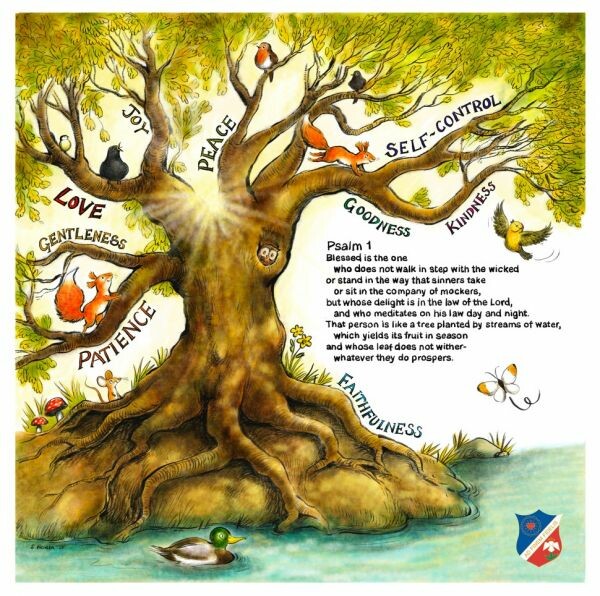Our Catholic Community
We have spent a lot of time as a whole School thinking about ‘community’ and what that means to us. One of the words that the children have been thinking about is ‘dignity’, and how we need to afford everyone dignity. In assembly, we have thought about communities that are like a tub of marbles and communities that are more like a bunch of grapes. We can all see the individual marbles and when we are all in the tub, the marbles are close together, but they are not connected, and if the tub is emptied, the marbles tend to scatter, and many may be lost as they roll away from the epicentre of the tipping.
Not so with a bunch of grapes. Grapes are all held together by a common thread. If a grape is plucked from the bunch, there is a hole where the grape used to be. Grapes are juicy and can be bruised. They are soft and organic and can be enjoyed, and squashed. But they are all held together by a single organic thread and this thread connects to a greater branch and whole until, ultimately everything connects back to the root that feeds the vine.
We have thought a lot about the type of community that we are and want to be. We identify with the grapes. We are all connected by our common values of Love, Joy, Peace, Goodness, Kindness, Gentleness, Patience and Self-Control. We don’t always get it right, but that is the community we seek to be and those are the characteristics we seek to cultivate as we grow.
There are three key texts that we reach for as we mould our thinking and behaviour in School:
The Story of the Good Samaritan: We can often think that we know what this story is all about, because we learned it at Sunday School and it’s a great story about kindness. But, whilst there is truth in this, it gives no credit to the radical and revolutionary teaching that Jesus was actually delivering to those who heard the story at the time. You see, the Samaritans and the Jews were enemies. There was deep hatred and suspicion between these groups. They were all part of the Israelite family (Samaria was made up of the ten northerly tribes and Judea the two based around Jerusalem), but they had fallen out following the death of Solomon and split asunder. The split was so filled with rancour that Judeans would walk around Samaria in order to get to the north. Jesus was therefore shocking his audience by telling them a story about a Jewish man going on a journey, being robbed and left for dead, not being helped by respectable fellow Jews, but by a Samaritan – his enemy. The historic Jesus did not walk around Samaria when he moved around Israel, he walked straight through and he loved the people he met there – e.g. John Ch 4 – The story of the Samaritan Woman at the Well. He calls us to love our neighbour (be kind, respect, serve) and sometimes our neighbour is also our enemy, but He still calls us to love them.
The Trick Question: You will probably guess from the tenor of the story around the Good Samaritan that the historic Jesus caused a bit of a fuss in the well-ordered theocratic regime within Judea. The apple cart was being prodded and poked and on more than one occasion, upset! As a consequence, He constantly received questions from figures within the regime that would test Him – they wanted to know if this incendiary preacher was ‘sound’. On one occasion, when Jesus had been challenged, a Pharisee asked Him which of all the commandments was the most important. Jesus responded with “Hear, O Israel, the Lord our God, the Lord is one. Love the Lord your God with all your heart, and with all your soul and with all your mind and with all your strength. The second is this: Love your neighbour as yourself. There is no commandment greater than these.” (Mark 12: 28-31). These words form part of something called the Shema – a Hebrew prayer, but, whilst there is a brilliance to the response in that Jesus deals with the potential trickery and the “Ah, but …” but he also makes a clear statement: we must love our neighbour and we are not honouring and loving our God if we don’t.
The Tree of Life: We all know that this features in the creation narrative within the Bible, but the tree I speak of is showcased in Psalm 1. A most beautiful image of what we should be. Imagine a sunny day. The only noise is the chirping of birds and the buzz of insects. We are sitting on the banks of a beautiful river that is running, lazily past us. There is the odd plop as a fish comes up. Sheltering us from the sun is a beautiful tree, its roots are in the river, and its branches are filled with life. This image is the image that the Psalmist paints as he speaks of who we should be. The tree is a place where there is life and there is a huge eco-system existing within, around and under the tree because it is there. It is nourished by the water. The Psalmist says, we are the tree and the water is the word of God. It says, “Blessed is the one … whose delight is in the law of the Lord and who meditates on his law day and night. That person is like a tree planted by streams of water, which yields fruit in season and whose leaf does not wither …” (Psalm 1: 1-3) We liked this image so much, we made it into a picture that we have in the School entrance.

We recognise that our community is made up of people from all around the world. We have a multitude of cultures, languages, faiths and ways of doing things represented within our community, but we are, nevertheless, one. Whilst we express our one-ness through the teachings of the Bible, the one-ness that we express transcends being a Catholic or Christian.
Our Golden Thread is that we love our neighbour – and our neighbour is not the person who lives next door, or our best buddy, but it is everyone. And it’s a tough love. How do you love the unlovely? Well we are asked to do so.
So, we have reflected on what sort of community we are and want to continue to be. We know we are setting the bar high, but we seek to be a community that keeps its roots in the cool waters of wisdom, that we as individuals become like a tree where all around us can thrive – we give, we love, we grow, we respect, we enable – and a community that seeks to take the tough road of love straight through Samaria.







